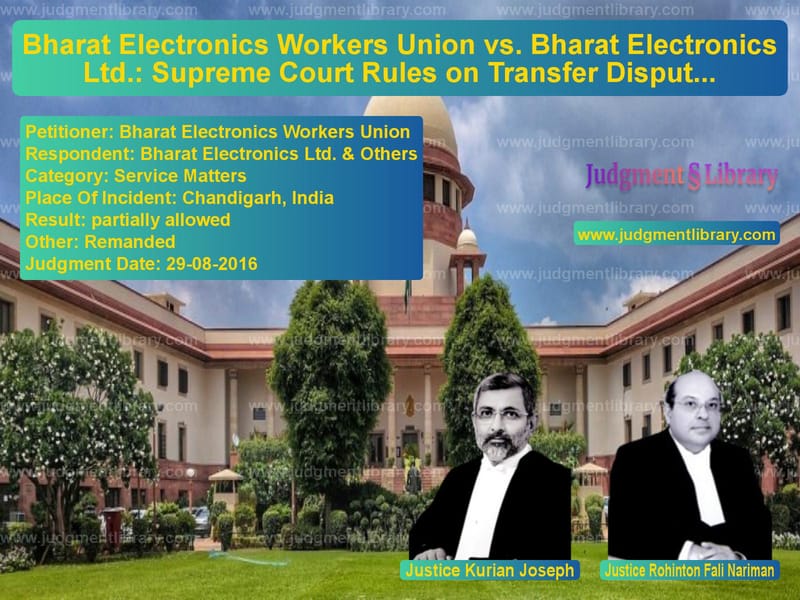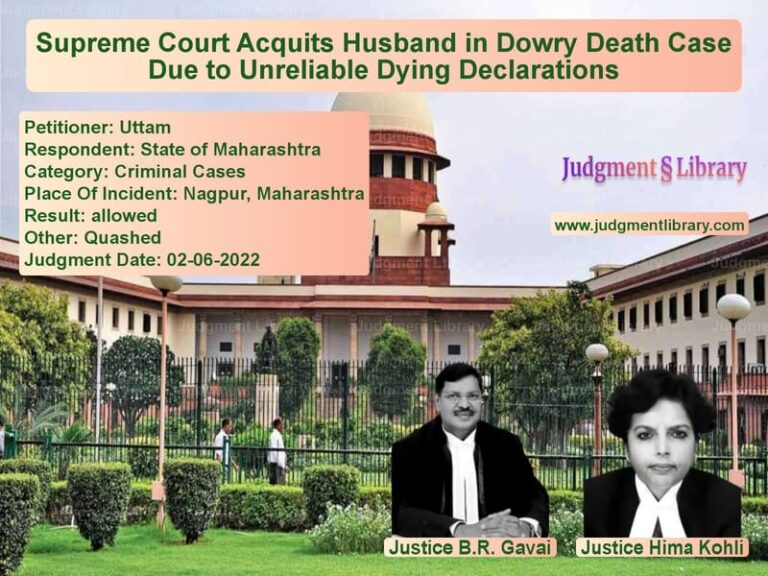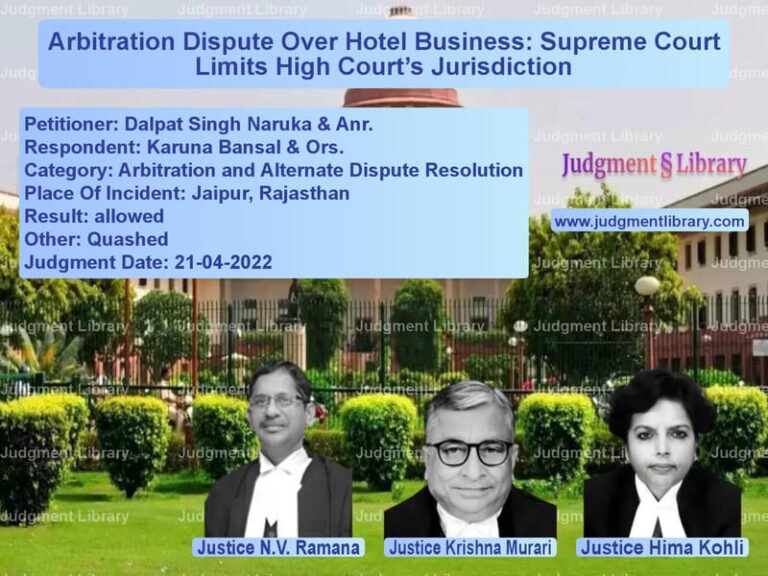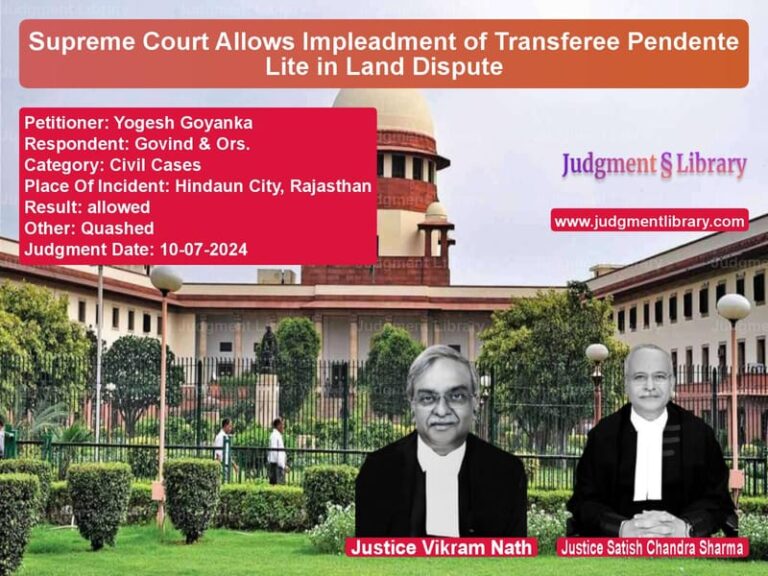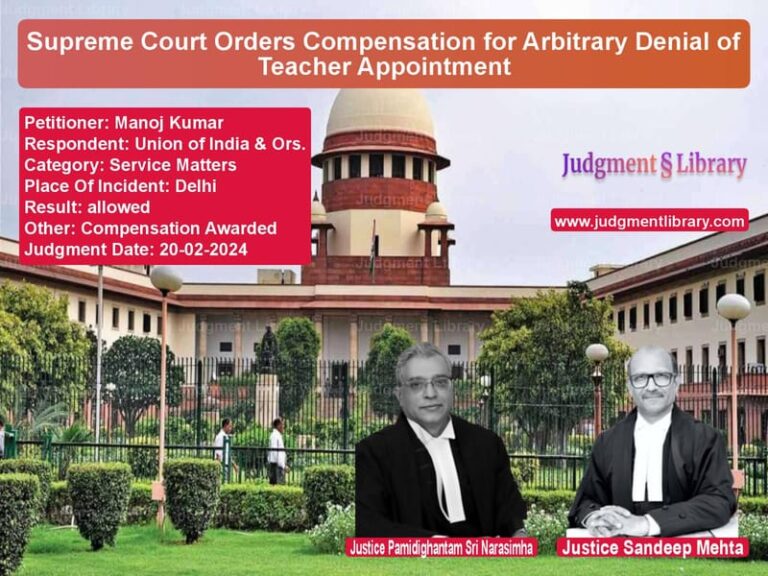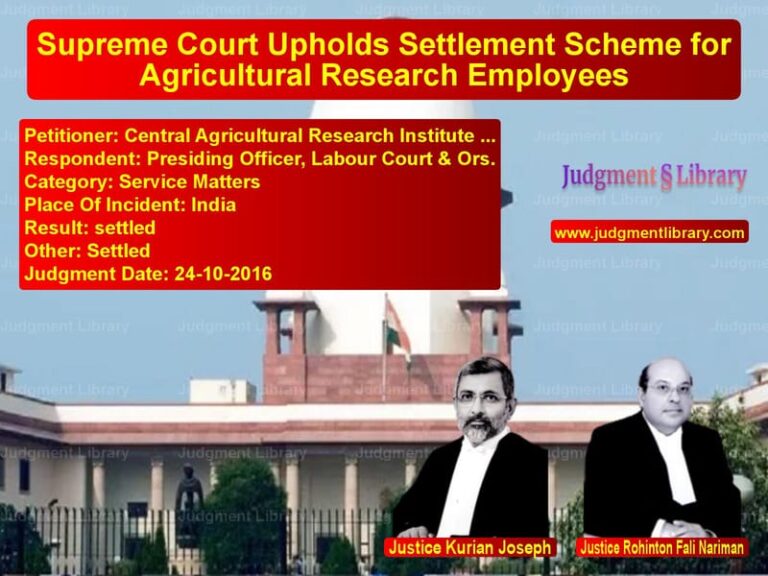Bharat Electronics Workers Union vs. Bharat Electronics Ltd.: Supreme Court Rules on Transfer Dispute
The case of Bharat Electronics Workers Union vs. Bharat Electronics Ltd. & Others deals with a labor dispute concerning the transfer of employees at Bharat Electronics Ltd. (BEL). The Supreme Court was called upon to determine whether the transfer orders issued to the workers were valid, given the standing orders and the legal framework governing industrial disputes. The case highlights key principles related to labor law, transfer policies, and industrial tribunal jurisdiction.
Background of the Case
The dispute arose when Bharat Electronics Ltd. (BEL) issued transfer orders to certain employees, prompting the Bharat Electronics Workers Union to challenge the transfers. The Union contended that the transfers were unjustified and contrary to the standing orders applicable to the employees.
The case was initially taken up by the Punjab and Haryana High Court in LPA No. 590 of 2014. On September 16, 2015, the High Court ruled that the reference made by the appropriate government (Government of India, Ministry of Labour) was not tenable as it was contrary to the standing orders. However, the High Court provided liberty to the government to reconsider the grievances of the workmen and take a fresh decision.
Legal Issues Before the Supreme Court
- Whether the reference made to the Industrial Tribunal was legally valid.
- Whether the transfer orders issued by Bharat Electronics Ltd. violated the standing orders.
- Whether the workers who had not joined their new workplace should be given relief.
- Whether the Industrial Tribunal should be directed to expedite the matter.
Arguments by the Appellant (Bharat Electronics Workers Union)
The Union, representing the affected workers, raised the following arguments:
- The transfer orders issued by BEL were arbitrary and violated the rights of the employees under the standing orders.
- The High Court’s ruling failed to appreciate the impact of the transfers on the workers’ job security and working conditions.
- The Industrial Tribunal should be allowed to decide the matter without delay to ensure justice for the workers.
- Workers who had not yet joined their new workplace should not be forced to do so until the matter was resolved.
Arguments by the Respondents (Bharat Electronics Ltd. & Others)
Bharat Electronics Ltd., the employer, countered with the following points:
- The company had the authority to issue transfer orders as per the terms of employment.
- Most of the affected workers (11 out of 15) had already joined their new workplaces, showing that the transfers were not unreasonable.
- The Industrial Tribunal was already handling the matter, and further interference by the Supreme Court was unnecessary.
- The company had followed due process and had not violated any legal provisions.
Supreme Court’s Observations
After hearing both parties, the Supreme Court made the following key observations:
On the Validity of the High Court’s Order
“We do not propose to go into the validity of the impugned order passed by the High Court by which the High Court has declined to grant any stay of transfer.”
The Court declined to interfere with the High Court’s decision and instead focused on ensuring a speedy resolution of the matter before the Industrial Tribunal.
On the Role of the Industrial Tribunal
“The Central Government Industrial Tribunal, Chandigarh, is directed to dispose of the Reference and pass an award expeditiously and at any rate within a period of four months.”
The Court emphasized that the matter should be resolved quickly to avoid prolonged uncertainty for the workers.
On the Status of the Workers Yet to Join Their New Workplace
“Till the Reference is answered, the status quo, as on today, with regard to the place of work of the remaining 4 workmen, shall be maintained.”
This meant that the four workers who had not yet joined their new postings would not be required to do so until the Tribunal delivered its decision.
Final Judgment
The Supreme Court disposed of the appeal with the following directions:
- The Industrial Tribunal was ordered to decide the matter within four months.
- The status quo for the four workers who had not yet joined their new workplaces was to be maintained until the Tribunal’s decision.
- Both parties were directed to cooperate with the Tribunal to ensure the matter was resolved expeditiously.
Implications of the Judgment
The Supreme Court’s ruling in this case has several important implications:
- Emphasis on Speedy Justice: The Court reinforced the need for prompt resolution of labor disputes by directing the Tribunal to deliver its award within four months.
- Recognition of Workers’ Rights: By maintaining the status quo for the affected workers, the Court acknowledged the hardships that arbitrary transfers could impose.
- Role of Industrial Tribunals: The judgment clarified that the Industrial Tribunal has the jurisdiction to decide disputes related to transfer policies and standing orders.
- Balance Between Employer and Employee Interests: The ruling ensured that while employers have the right to transfer employees, such transfers should be subject to legal scrutiny.
Conclusion
The Supreme Court’s decision in Bharat Electronics Workers Union vs. Bharat Electronics Ltd. reaffirms the role of Industrial Tribunals in adjudicating labor disputes. By ensuring that workers were not unfairly displaced while the dispute was pending, the Court upheld the principles of fairness and due process. The judgment also underscores the importance of timely resolution of such disputes, preventing undue hardship for both employees and employers.
Don’t miss out on the full details! Download the complete judgment in PDF format below and gain valuable insights instantly!
Download Judgment: Bharat Electronics W vs Bharat Electronics L Supreme Court of India Judgment Dated 29-08-2016-1741878625153.pdf
Direct Downlaod Judgment: Direct downlaod this Judgment
See all petitions in Employment Disputes
See all petitions in Transfers Cases
See all petitions in Disciplinary Proceedings
See all petitions in Judgment by Kurian Joseph
See all petitions in Judgment by Rohinton Fali Nariman
See all petitions in partially allowed
See all petitions in Remanded
See all petitions in supreme court of India judgments August 2016
See all petitions in 2016 judgments
See all posts in Service Matters Category
See all allowed petitions in Service Matters Category
See all Dismissed petitions in Service Matters Category
See all partially allowed petitions in Service Matters Category

